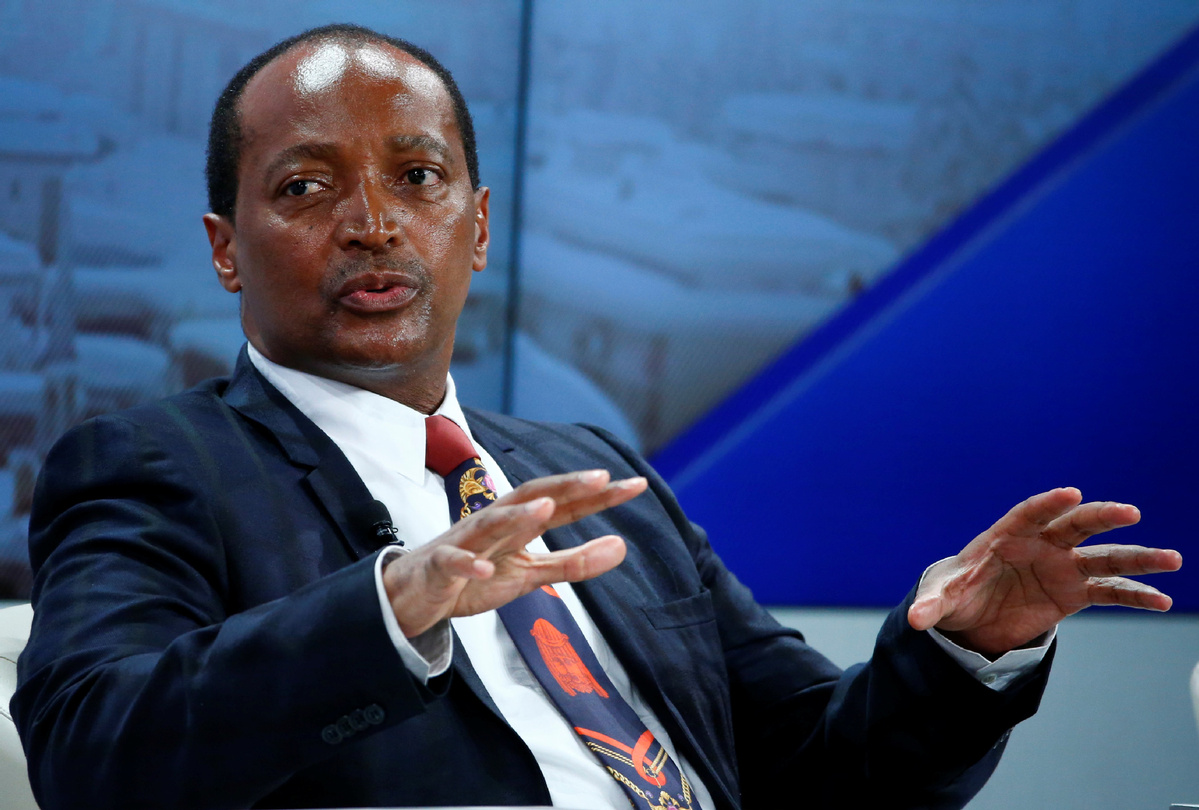
South African billionaire businessman Patrice Motsepe speaks at the World Economic Forum in Davos, Jan 23, 2015. (Photo: Agencies)
With coronavirus spreading rapidly across Africa, where it has so far infected over 4,700 people and killed 146, the international community, charity organizations and private sector enterprises have been making donations to help the continent fight the deadly epidemic.
On March 29, Patrice Motsepe, a South African businessman, announced that his group of companies will donate $57 million to help the country fight coronavirus.
Motsepe said the money will be channeled through the government to build health, water and education facilities.
On March 25, the Chinese embassy in Nigeria donated gift items to the country's Ministry of Health to help in the fight against the virus.
Osagie Ehanire, the minister of health, appreciated the embassy for its kind gesture and said Nigeria was ready to emulate the strategy that China used to control the epidemic.
This comes days after Jack Ma Foundation and Alibaba Foundation donated medical equipment, including over 1.5 million laboratory diagnostic test kits and over 100 tons of infection prevention and control goods to the Africa Centers for Disease Control and Prevention.
Through the donation, each of the AU member states received 20,000 laboratory diagnostic test kits, 100,000 medical masks, and 1,000 protective suits and face shields, to support their fight against coronavirus.
The Kenyan based Pwani Oil, an edible oil and soap maker, on March 26, provided 122 handwashing kits and 70 cartons of soap to be distributed to medical personnel in 11 of the country's 47 counties.
Rajul Malde, the commercial director at Pwani Oil, said his company is committed to partnering with various stakeholders to prevent the spread of coronavirus in Kenya.
"We recognize that our health workers are at the frontline of providing care to patients therefore they need all the support they can get during this critical period," he said.
Previously, Pwani Oil also donated 150 handwashing kits to be used by the public in various major urban centers across the country.
The UN Refugee Agency, is seeking $255 million for its urgent push to curb the risk and lessen the impact of coronavirus outbreaks in the vulnerable communities, as part of a wider UN Global Humanitarian Response Plan seeking $2.01 billion.
The agency said 70 million children, women and men displaced by war and persecution are among those at greatest risk as coronavirus pandemic spreads rapidly across the globe.
"Among them are some 25.9 million refugees, more than three quarters of whom live in developing countries in the Americas, Africa, the Middle East and Asia. With weak health systems, some of those countries are already facing humanitarian crises," the UN agency said.
The African Development Bank has raised $3 billion in a three-year bond to help alleviate the economic and social impact the Covid-19 pandemic will have on livelihoods and Africa's economies.
The Fight Covid-19 Social bond, has a three-year maturity, garnered interest from central banks and official institutions, bank treasuries, and asset managers including Socially Responsible Investors, with bids exceeding $4.6 billion.
This is the largest Social Bond ever launched in international capital markets to date, and the largest US Dollar benchmark ever issued by the Bank. It will pay an interest rate of 0.75 percent.
Dr. Akinwumi Adesina, president of the African Development Bank Group, said the Bank is taking bold measures to support African countries.
"This $3 billion Covid-19 bond issuance is the first part of our comprehensive response that will soon be announced. This is indeed the largest social bond transaction to date in capital markets. We are here for Africa, and we will provide significant rapid support for countries," he said.
Dr. Adesina said the continent will require many billions of dollars to cushion the impact of the disease as many countries scrambled contingency measures, including commercial lockdowns in desperate efforts to contain it.
He said globally, factories have been closed and workers sent home, disrupting supply chains, trade, travel, and driving many economies toward recession.


